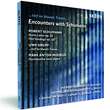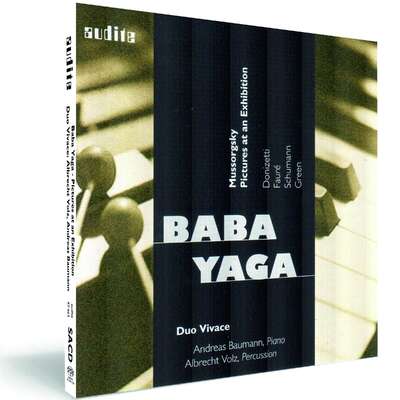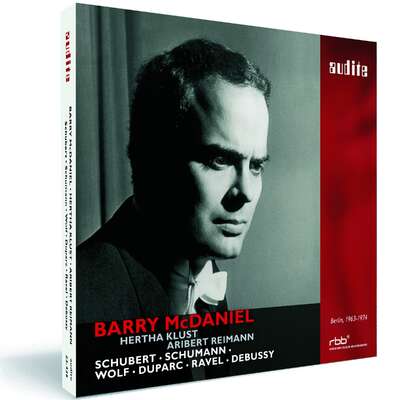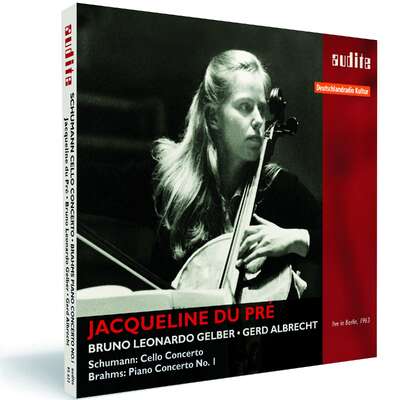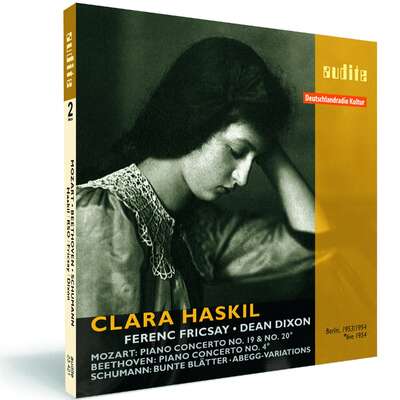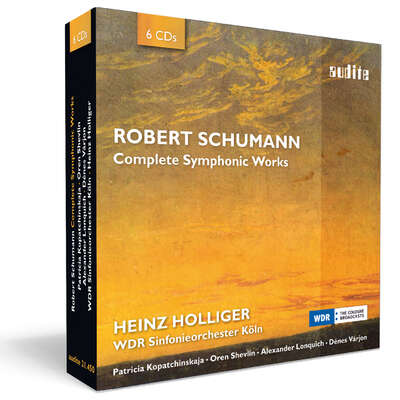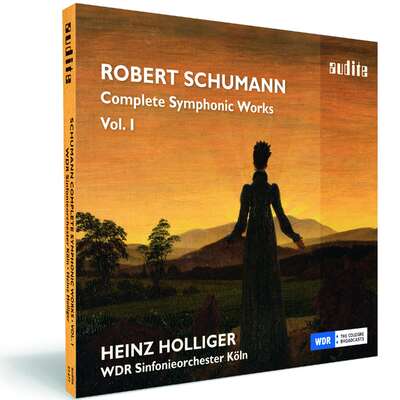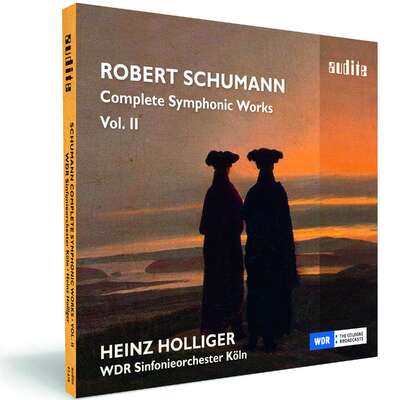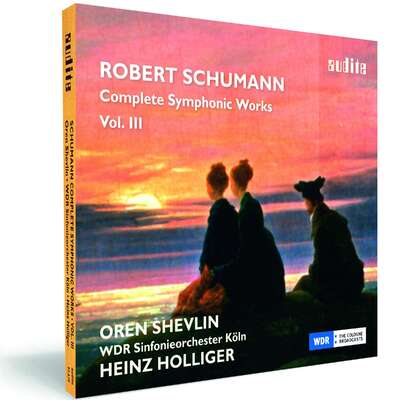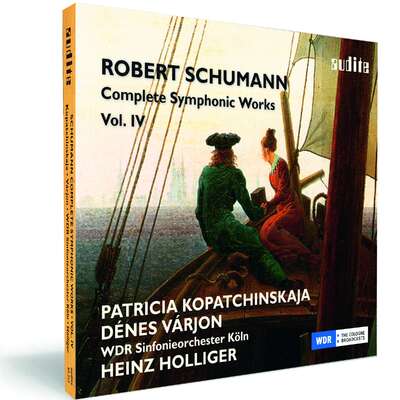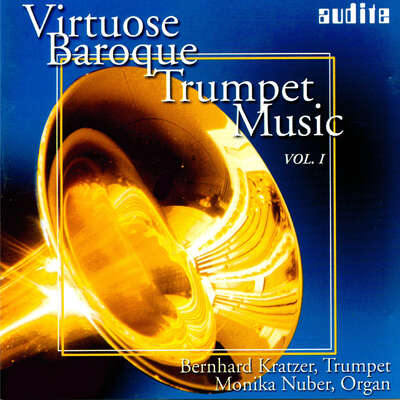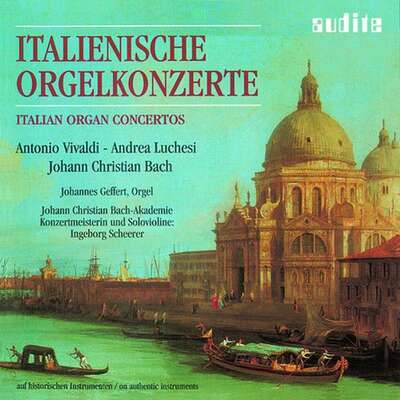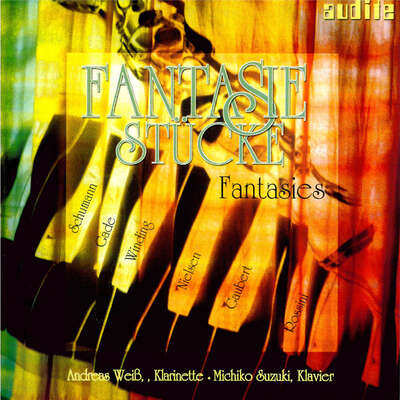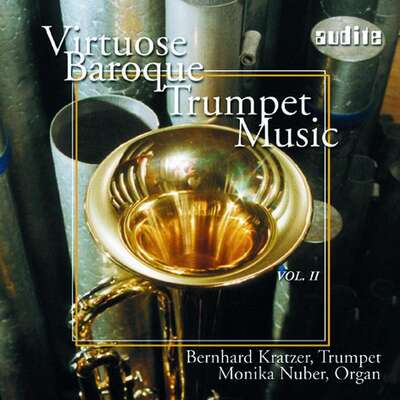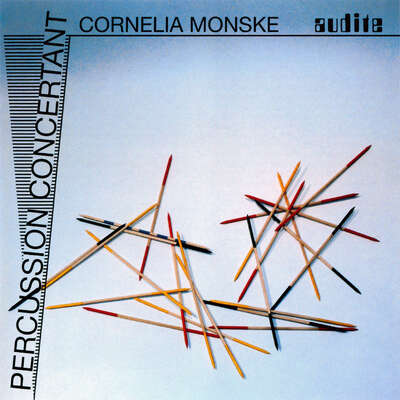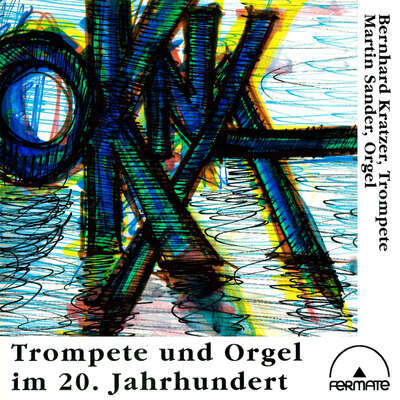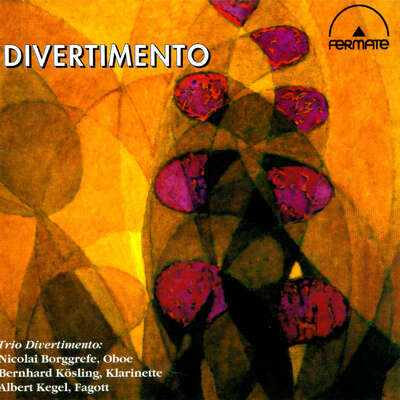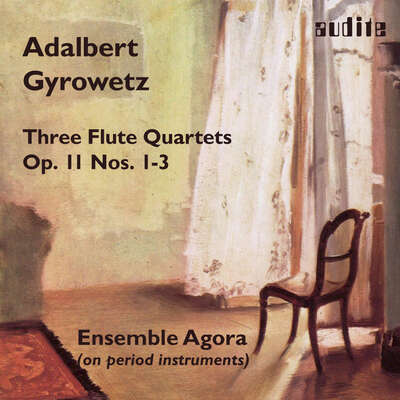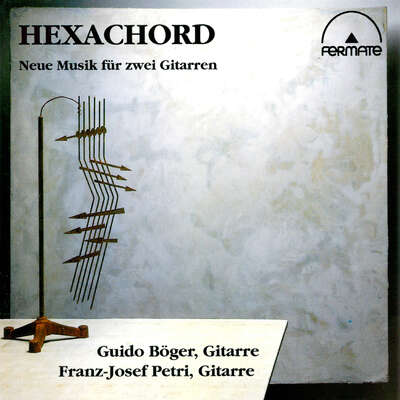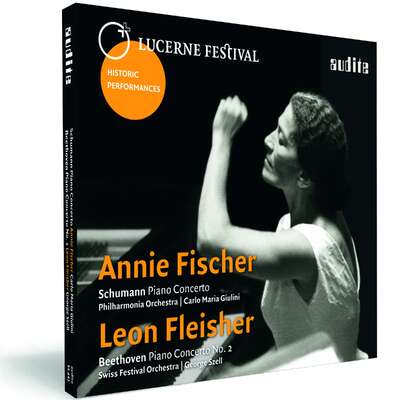
In this CD compositions from the age of classicism age are juxtaposed with contemporary works. Such stimulating contrasts point up how closely compositional means and ideas are bound up with the traditions of their period. This is all the more true when contemporary composers seek to come to terms...more
"Die Meistersinger under their conductor Klaus Beuninger are excellent, managing to perform both the Schumann and the contemporary piece as if they had been performing them all their lives. There was so sense of disjunction between the performances of the Schumann and the modern works, which is quite an achievement. This is a fascinating disc and if you are open to experiment then you are sure to find much here, especially with such confident performances." (musicweb-international.com)
Details
| Encounters with Schumann - ...tief im blauen Traum... | |
| article number: | 97.532 |
|---|---|
| EAN barcode: | 4022143975324 |
| price group: | BCA |
| release date: | 20. June 2007 |
| total time: | 67 min. |
Informationen
In this CD compositions from the age of classicism age are juxtaposed with contemporary works. Such stimulating contrasts point up how closely compositional means and ideas are bound up with the traditions of their period. This is all the more true when contemporary composers seek to come to terms with classical works and texts, and a direct comparison becomes possible with the traditional interpretation of a classical composer. This is the case in the present CD, in which Uwe Kremp and Mark Anton Moebius turn their attention to Robert Schumann’s compositions for male-voice choir. Here original compositions by Schumann are interwoven with intensive and highly personal productions by two young composers.
The Sechs Lieder Op. 33 by Schumann serve Uwe Kremp as the textual starting-point for his Five Intermezzi “…tief im blauen Traum..” He takes up the original texts in fragments, mostly extracted from the preceeding strophe of the poem chosen by Schumann, and shortens them in the course of the intermezzi. At first whole verses are used as quotations, but these are progressively reduced to single lines or words, an isolated word broken up into its syllables, lone phonemes and finally singable vowels and percussive consonants. The use of percussion mirrors the sound aspects of consonants and noise in speech.
Mark Anton Moebius takes as his starting-point a text by Rilke which, with its apposition of man and animal, finds partners in the love of the chase evoked in Laube’s poems and in Schumann’s romantic hunting motifs. In “Fluchtpunkte eines Jägers” the use of a cor de chasse, always associated with hunting, and the cor anglais, predestined to create a bucolic atmosphere, links up with the hunting motifs in the Schumann. As regards content, Mark Anton Moebius concerns himself closely with the theme of hunting. He sets out to depict the moment when the huntsman looks into the animal’s eyes and sees himself in them: the moment in which every aspect to do with the culture of hunting disappears. For years Mark Anton Moebius has been preoccupied with natural notes, the spectres of overtones and undertones, and with an organically developing harmonic system as exemplified in this recording.
Reviews
Fanfare | May/June 2008 | Lynn René Bayley | May 1, 2008
Back in the days when Michael Gielen was music director of the Cincinnati Symphony Orchestra (how I enjoyed him, and how I miss him!), he gave aMehr lesen
This CD simulates that kind of concert, interspersing some nice but not always inspired male choral pieces by Schumann with vocal and instrumental music based on those themes, harmonies or rhythms by Uwe Kremp and Mark Anton Moebius. I cannot praise Kremp or Moebius highly enough for their imagination or inventiveness. In the manner of Stravinsky, or sometimes Britten and sometimes Segerstam, they either develop new melodies in the tonal style or develop new rhythmic and/or harmonic fantasies on Schumann's songs. Nor does it hurt that the chorus, Die Meistersinger, is not only first-rate in blend and precision but wholly enters the spirit of this enticing sort of fantasy. Hubert Wild, who at first sings a baritone solo, shocks the ear with a stunningly female-sounding countertenor on track 20. Very high marks for the Detmolder Horn Quartet as well.
My lone reservation about the performance is that it sounds just a tad too well rehearsed and not quite spontaneous; but this is a minor quibble, believe me. All the performers work hand-in-glove to produce not only a texturally satisfying performance but also a beautiful flow as the music weaves between Schumann and Kremp in the first half, Schumann and Möbius in the second. Kremp's music is more percussive in rhythm, Möbius's more vocal in concept and more harmonically daring, but it is a close call, and both have written highly effective pieces.
I would love to give a detailed analysis of their scores, but in the interest of space—and in the interest of wanting to leave the disc a bit of a surprise for the first-time (or third-time) listener—I shall reserve my praise to one piece each. The first variation by Kremp deconstructs the first Schumann chorus in a way that strongly reminded me of Stravinsky's work in Pulcinella and especially Le baiser de la fee, while Möbius's most stunning piece was undoubtedly his third variation on the second Schumann work, in which I almost expected the harmonies to drop through a trapdoor into a Mahler or Schoenberg-like soundscape.
Did I say how much I enjoyed this CD? Then I'll say it again. Even if you are not particularly a fan of either Schumann or male choral music (I happen to enjoy the former but am not really addicted to the latter), this CD is a must for any music-lover who considers him or herself open to new sounds and new ways of looking at older works through the mirror of a modern composer's mind.
Well done, all! Now, can we bring Michael Gielen back to Cincinnati?
American Record Guide | March/April 2008 | Greenfield | March 1, 2008
There's a fine men's choir at work in this program, billed as Encounters With Schumann – gorgeous accounts of the five hunting songs of Opus 137 andMehr lesen
Mind you, the level of artistry is high all around, so if you don't mind bouncing back and forth between the 19th and 20th centuries, this could be of interest. But if (like me) you'd prefer to take your Schumann straight and move on to the modernists only after Robert is finished speaking, this could prove jarring in the extreme. For these same songs blissfully uninterrupted, try the terrific MDG 6221316 (Nov/Dec2005).
www.musicweb-international.com | February 2008 | Robert Hugill | February 1, 2008
This CD is something of a trap for the unwary, for those (like me) who put the disc on without reading the liner-notes properly. The first trackMehr lesen
At this point your reviewer returned to the liner-notes and read them properly. The disc by Die Meistersinger and Detmolder Hornquartett consists of Schumann’s Sechs Lieder, Op. 33 and his Fünf Gesänge, Op. 137 for four-part male-voice chorus and four horns. In addition they perform Uwe Kremp’s ‘…tief im blauen Traum…’ four-part male voice chorus and two percussionists and Mark Anton Moebius’s Fluchtpunkte eines Jägers for four-part male-voice chorus, baritone solo, cor anglais and horn. The point to understand from the notes is that the movements of the Uwe Kremp piece are interleaved with the Op. 33 lieder, so that the effect I perceived at the end of the 1st Schumann movement was deliberate. Similarly Moebius’s piece is interleaved with the movements of Schumann’s Op. 137.
Die Meistersinger is a male voice choir which has its origins in the Gächinger Kantorei. The ensemble was founded in 1998 and has been conducted by Klaus Breuninger ever since then. They have made a number of discs but this fascinating one seems to be their way of trying to re-vitalise the tradition of the male-voice chorus.
Schumann’s works in this genre date from 1840 and seem to have been written for the Leipzig Men’s Choir Association for whom Mendelssohn’s Op. 50 Lieder were written. We know that in 1836 Schumann, Mendelssohn and friends tried out Mendelssohn’s four-part male voice choir pieces - presumably singing one to a part - and Schumann’s letters suggest that this might be the case also for his own pieces. This would make sense as we know that Mendelssohn tried out some of Schumann’s solo songs before their publication.
The resulting pieces have a robust charm and their particular genre has an atmosphere redolent of the men’s associations, glee clubs and the like. I know that Schumann’s pieces are far more sophisticated than glees, but the very particular sound of the male voice chorus does give rise to these thoughts.
It is thus understandable that the performers should seek to vary the diet by interspersing Schumann’s Six Lieder with Uwe Kremp’s Intermezzi. Kremp studied composition in Karlsruhe with Mathis Spahlinger and Wolfgang Rihm. Kremp’s Intermezzi use fragments of Schumann’s texts, usually taken from the previous verse, to create a dream like extension of the Schumann pieces. Gradually, as the Intermezzi proceed, Kremp dismantles the linguistic elements so that by the end the choir are just singing sounds, not sense. Into this mix, Kremp adds two percussionists “to create an additional resonance space for the noise-like aspects of the consonants in language”.
The results are fascinating and make for an interesting mix; we end up listening to the Schumann pieces with new ears. I am not entirely sure that the experiment works completely, but it is certainly worth making and very much worth listening to.
Schumann’s Op.137 songs for male-voice choir and French Horns are directly related to the Forest Scenes Op.82. The texts come from Heinrich Laube’s Hunting Breviary and the pieces inhabit that Romantic huntsman’s world which was tapped into by Weber and others. Mark Anton Moebius’s Fluchtpunkte eines Jägers (Vanishing Points of a Hunter), uses a combination of voices, horn and cor anglais to link the Schumann items.
Moebius uses a text taken from Rilke’s Eight Duino Elegy to create a series of pieces which meditate on the confrontation between man and animal, his intention being to illuminate the moment when the hunter looks the animal in the eye and recognises himself in it. Like the Kremp/Schumann combination, this is a potent mix which allows us to view and hear the Schumman pieces differently. The solo part requires the singer to mix both baritone and counter-tenor registers, something Hubert Wild does brilliantly.
Not everyone will like this experiment. Kremp and Moebius’s pieces can be difficult but are quite approachable, but their alternation with Schumann’s music will not be to all tastes. Personally I found it intriguing and fascinating, but would sometimes be tempted to re-programme my CD player so that I could get the Schumann pieces on their own.
Die Meistersinger under their conductor Klaus Beuninger are excellent, managing to perform both the Schumann and the contemporary piece as if they had been performing them all their lives. There was so sense of disjunction between the performances of the Schumann and the modern works, which is quite an achievement.
This is a fascinating disc and if you are open to experiment then you are sure to find much here, especially with such confident performances.
WDR 3 | HörZeichen vom 13. August 2007 | Sabine Weber | August 13, 2007
Entstanden sind sie teilweise sogar zeitgleich, in Schumanns „LiederjahrMehr lesen
Diverdi Magazin | n°161 (julio 2007) | Blas Matamoro | July 1, 2007
Schumann: una respuesta diferida
Un extraño viaje a través del mundo lírico del autor alemán
A veces, la historia gasta estas severas bromas: una partitura halla su comentario pertinente no en un contemporáneo del compositor correspondiente,Mehr lesen
Dos colegas muy posteriores, Uwe Kremp, nacido en 1963, y Mark Anton Moebius, nacido en 1973, deciden glosar estas piezas. Meter cuñas de música muy de la fecha habría sido una impertinencia ineficaz. Al revés, han querido, utilizando una convención actualizada, prolongar algunos aspectos de la obra schumanniana, como si el propio Schumann estuviera presente y debiera dar su aprobación. De tal modo, al escucharlas entreveradas con los "originales", se advierte la continuidad de los climas aun teniendo en cuenta la diferencia de lenguajes. No sólo se trata de oír cosas nuevas sino de escuchar a Schumann con nuevos oídos. Su fantasma, acaso benevolente, nos apoya el buen humor que, de repente, nos convierte en estudiantes y cazadores del romanticismo.
